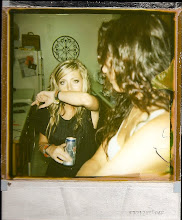So the subjects of these two articles kind of rings true to me this month because I, too, have encountered similar issues with the film I submitted to the Cucalorus Film Festival. Ultimately, the entire film was mine and Carolyn's because all of the images were archival footage, the only thing that wasn't was the voice-over track. But, although this was taken from a true story, it was so chopped up and manipulated that if it were to be read by someone else it would barely be recognizable to the man who told the story originally in his 3 hour interview. Which I must mention that our film is only 5 minutes long. Anyways, at the moment I have been given the okay to resubmit my film if I re-record the audio track. Because at that point, nothing will belong to the original director of the original project. The article "Molotov Man" is truly all about what I have been going through with my film, because the director is worried about his obligations to the original subject of his film, while I believe my film has taken on a whole different meaning that is completely separate from his original project. Who decides this ultimately? I guess now that they have made the directors sign that they own their projects in class now makes it a little less complicated. But, as the article writes about, everyone views things differently and things are changed when they are reworked.
We even encountered issues much like this when myself and my group in Intermediat documentary class shot a film about two dj's who take music made by others and manipulate and make it into something different. We were told by many of our prof. that as long as the music was manipulated enough it shouldn't become too much of an issue on the festival circuit. And while searching out festivals to submit this film to I came upon a project entitled, "RIP: A Remix Manifesto" directed by Brett Gaylor. He has made a film about the dj girltalk, who has made his career on the "ripping" of other people's music. The film is about how artists should be able to do this and crazy enough people have the opportunity to download the raw footage from the film and actually edit it and manipulate it in their own way and resubmit it to the site. It is kind of playing on its own subject matter. I find this extremely interesting.
When taking American Film after 1961 with Dr. Kreul, we read soooooo much about this idea of allusionism and post-modernism in which people are recycling old ideas and making them new. I specifically remember this example of emparchment or something of this nature....i couldnt find the article, but it gives the example of a piece of parchment paper that is written on once and at some point in time it begins to be written over top of...but all the while if you were to go and peel that paper down to the original layer you would find the original source. Copyright laws and such are a touchy subject that I myself don't know where I stand on the issue, but it seems that at this point in time a lot almost everything has been done at some point or another. I believe that this is also the standpoint of many modernist artists, specifically the poets because I have read a lot about those people in my modern poetry class. Alot of them like to re-work past pieces or incorporate those ideas into their art....which we specifically read "The Wasteland", which is mentioned in the article as someone who has specifically done this re-working. And it is the truth that most comedies and comedic cartoons that we love so much would have no humorous qualities without the re-working or allusions. In American film I was actually so surprised with how many things I have been exposed to that I believed to be the original piece, but have in reality only been reworked. There is an article by Noel Caroll that I specifically remember in my mind. I actually think that most people don't realize how much this sort of thing actually happens. And like the article,"Ecstasy" mentions, how could we possibly even catch every single account in which this occurs. But, if they had actually passed that law that a person cannot take a picture of a person or a building or anything with out permission, where would art be today. That would be a catastrophe.
Subscribe to:
Post Comments (Atom)

No comments:
Post a Comment